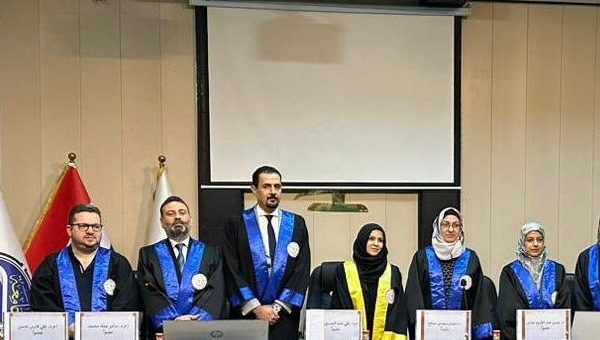The Faculty of Pharmacy discussed the PhD dissertation in clinical chemistry entitled “Serum Level of Carnosine in Relation to Genetic Polymorphisms of Carnosine Synthase-1 and Carnosinase Isoform (1 & 2) in A Sample of Iraqi Type 2 Diabetics With Established Cardiovascular Diseases) by Haneen Subhee Shaheed and her supervisor, Prof.Dr. Shatha Hussain Ali. This study was aimed at estimating the occurrence of Carnosine synthase -1 SNP (rs 1790733) on the Carnosine gene, Carnosinase-1 SNP (rs 2887), and Carnosinase-2 SNP (rs 6566810) in a sample of Iraqi type 2 diabetics with and without cardiovascular diseases and investigating the possible existing effects of these polymorphisms on serum levels of Carnosine, Carnosine synthase-1, Carnosinase isoform 1 and 2, as well as sRAGE levels, and their impact on the development of CVD in T2DM patients. This study was designed as a cross-sectional study in two centers in Baghdad city, including the National Center for Diabetes Research and Treatment, Al Mustansiriyah University, and the Ibn Al-Bitar Center for Cardiac Surgery, during the period from April 2022 until October 2022. Despite the low number of subjects carrying it, the presence of the GG mutant genotype of RS 179733 increased the chance of disease (CVD as a T2DM complication) occurrence in T2DM with and without CVD. As a result, decreased carnosine and carnosine synthase-1 serum levels in both diabetic groups were caused by the indirect effect of single nucleotide polymorphism on hyperglycemia in the diabetic groups, which clarified The presence of the AG heterogeneity of the carnosinase-1 gene polymorphism (RS 2887) plays a role in T2DM complications, especially CVD, in subjects carrying the GG mutant genotype (69.4%). The effect of SNP (rs2887) in subjects carrying GG mutant genotypes on serum levels of biomarkers boils down to a decrease in carnosine synthase-1, which led to a decrease in carnosine serum levels indirectly, and at the same time, an increase in carnosinase 1 and 2 isoforms, which led to an increased risk of disease in patient groups, while an increase in sAGER in the control group. Finally, the presence of the AC heterogeneity of carnosinase-2 single nucleotide polymorphisms (rs6566810) increased the risk of disease in T2DM without CVD more than in T2DM with CVD and had no effect on serum levels of biomarkers measured in the current study. There was a decrease in serum levels of carnosine, carnosine synthase-1, in two patient groups, which led to an increased risk of CVD as one of the most dangerous T2DM complications.



